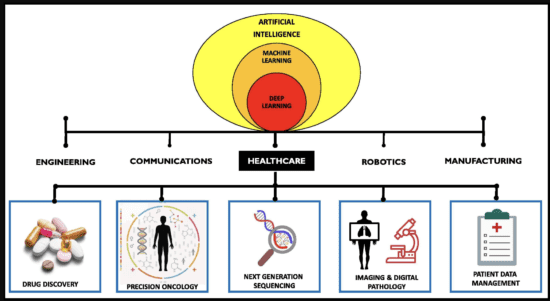Oncology promises to be one of the medical specialties that AI can have a huge impact long-term. The reason is that there are many different types and subtypes of cancer and successful diagnosis of each and subtyping can lead to better and more personalized management. As a matter of fact, the successful management of cancer long-term will very much come down to identifying the genetic abnormalities that predispose or lead to that type of cancer and directing therapies to those specific abnormalities. That means analysis of huge amounts of genetic and other data to identify patterns and linking them to individual cancer types. This is only a job for AI! Handling large amounts of multi-dimensional data and finding patterns is what AI was made for.
When we speak with oncologists, many indicate that finding new targets will be one of the key contributions of AI. In order to do that, you need large datasets such as proteomics, genomics, transcriptonomics, histologic data, and more. This data is increasingly available but the data may not be in a form right now that makes it readily available for developing AI algorithms. Another area for AI in Oncology would be to find subtle patterns in histopathology data that are not noticed or looked for by the Pathologists. Also, a good source of data in oncology is in-vitro data, generated in lab by observing response to different interventions, in these situations, AI algorithms may be able to see things that normal observation methods cannot.

Some of the applications we can expect to see in oncology include:
- Increasing number of biological matters and better ways to measure this matter means AI can help better understand disease. AI needs multi-dimensional data and this data is increasingly becoming available. AI can help construct new medicines, find new targets, find new patient populations, and help identify combination therapies.
- Digital twin technology will be important in Oncology. Multimodal data plus AI can enable this. Immune function will be better understood and new therapies developed.
- Better diagnostics by AI by picking up on subtle patterns not visible to human eyes.
Google has made significant investments in pursuing AI applications in healthcare, including in oncology. Since 2017, the company has partnered with the NHS and Cancer Research UK Centre at Imperial College London to further this research and improve early detection of breast cancer. DeepMind is also working on other cancers like head and neck cancer. DeepMind’s work in this area is more related to treatment design, with the company trying to apply AI to speed up the mapping process for determining where radiotherapy should be applied. The current mapping process takes approximately four hours—DeepMind believes it can shorten it to one






